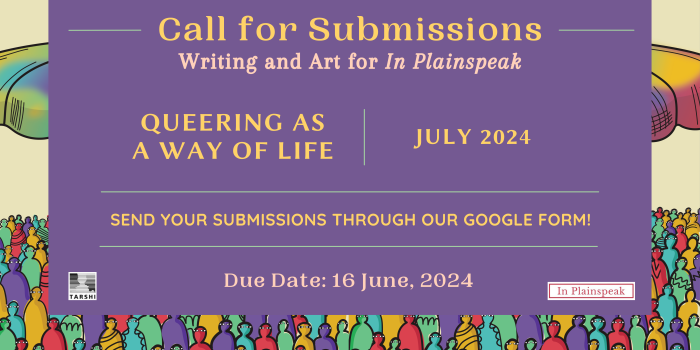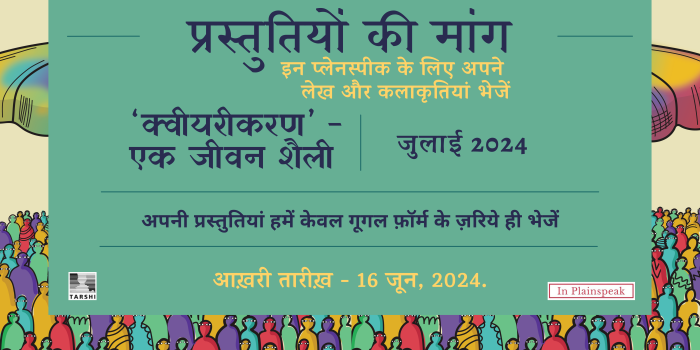
Sometimes it feels like it was aeons ago and sometimes it feels much closer. The COVID pandemic began in 2019. And then came March 2020 – India’s first nationwide lockdown to contain its spread. So much happened then, and since then. Masking, physical distancing, quarantine. Factory shutdowns. Migrant labourers struggling to return home. Crises in health centres. Shortages of essential goods. Hardship, loss, suffering. And yet, or despite it all, a burgeoning of newer ways of communicating, connecting, crowd-sourcing, networking, reaching out, and touching lives. Of reaffirming the significance of emotional connection and the resilience of the human spirit. The April Issue’s offering of articles, poems and fiction is an eclectic mix that (mostly) reflects what was borne out of the pandemic, and its impact on sexuality, intimacy, relationships, and more.
Could lovers meet where they wished or did they have to meet behind bushes? Gitanjali’s article focuses on class as a factor in access to sexual intimacy – with the lockdowns, what happened to people who depended on hidden nooks in public parks to find a moment of privacy? As she points out, the lockdowns were a great equaliser and even those more privileged could no longer meet and mingle freely. Loneliness cuts across all classes and Andy Stephen Silveira’s short story beautifully illustrates the sense of desolation and the yearning for touch that ensued after days of not being able to feel another body against one’s own. Hitaishi Gautam’s poem brings to life foggy, rainy Manbir Colony and what it was like for a young person to be far from home, eating canned tuna cooked with onion, chillies and tomatoes.
Kaveri’s lockdown logs offer an intimate glimpse into the quotidian aspects of a break-up during lockdown while Carol D’Souza’s two poems leave us with a sense of being joyously startled. Sara Haque evokes with a quiet, almost unbearable, grace what would happen when a lover would die.
The COVID-19 pandemic now seems like an enraged monster that appeared out of nowhere and was finally calmed. But there’s another one that has been around for long and shows no signs of leaving – the pandemic of flashing phalluses that Andal Srivatsan and generations of women have learned to survive.
In Hindi, we bring you a translation of Vani Viswanthan’s article on TARSHI’s self-care and collective care initiatives during the pandemic.
Before you go, see what our respondent Abhishek Desai has to say about the pandemic and sexuality in our new feature, Quick Bytes, and check out Sexy Times, TARSHI’s survey on sexual lives and pleasure in COVID-19 times.
People are the heartbeat of effective policies. But it’s often the other way around in our topsy-turvy world, and COVID-19 further scrambled it. Free of jargon and blah blah, the articles in the May Issue of In Plainspeak directly show us what matters most. Even though, to many, masking and physical distancing seem like strange rituals of a time past, the effects of the pandemic remain with us.
Shikha Aleya examines whether there were and are certain populations that experienced the debilitating effects of the pandemic more than others and what meaningful changes, if any, are being made on the ground. On the ground – not up in the air, or in an ivory tower, or as verbose recommendations in a policy paper far removed from the reality that people experience in their skin, in the streets, and in their homes (if they are privileged enough to afford to live in one). In other words, how can the knowledge and experience that all of us have, be converted into practices that work across infrastructures and support systems, for the good of all of us?
Dr. Suchitra Dalvie, in an interview with Shikha Aleya, speaks of her insights as a gynaecologist, a feminist, a pro-choice advocate, and, most importantly, as a person who cares passionately about people and their rights. Suchitra exposes how policies failed us, the chinks and gaps in our current health systems, the reality that women make up the majority of health care providers, and the multiple facets of violence that the lockdowns exacerbated. Fear not, it is not all bleak! There’s a lot of wry humour as well as compassionate, humane and practical suggestions for support, healing and change.
Sometimes things change, and sometimes they don’t. Either way, it’s useful to connect the past to the present. We are introducing a new feature, Then and Now, in which the authors of yesterday’s article speak today of how, or if and how, the issues, environment, society and community, or their own lens, have changed. In October 2021, Meher Suri and Kuhika Seth had written for us about the impact of the pandemic and the lockdowns on women and transgender sex workers. Now, in May 2024, Kuhika and Meher reflect on whether there have been any shifts or changes in the policy landscape and in sex workers’ rights and entitlements since that time.
In Hindi we have translations of two articles. One is Siddharth Narrain’s article on online dating and on using technology, at a time when people had to keep apart physically, to communicate and keep in touch loved ones, and to seek out new connections and possibilities. The second is Deepa Ranganathan’s article on caring and care-giving. In April 2020, Deepa gave birth to her first child. What did it mean for her to take care of “…my needs, as a woman, as an activist, as a feminist, as a writer, as a mother, while we also remain stuck in the middle of a seemingly never-ending pandemic?”
‘Post’ pandemic, its effects keep changing shape and many of us are still in need of care and support as we recover and heal. Check out our curated resources on sexuality and SRHR, gender, self-care and wellbeing, marginalised communities, and more.
Go gently, go well.


Cover Image: Ed Dingli for Fine Acts